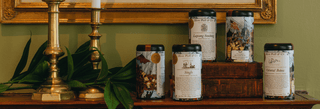Blog
-
Peppermint Tea
Explore the many benefits of peppermint.
-
Cinnamon, Cinnamon, Cinnamon!
Cinnamon tea contains lots of antioxidants, which are beneficial compounds that keep you healthy.
-
Ginger Tea
Discover the powerful herbal properties ginger offers in a delicious cup of tea.
-
Tea Books
Tea lovers, check out these book recommendations!
-
Holiday Blends
Stop by the Retail Shop to experience these lovely tea and coffee aromas for yourself ortry them at home by ordering from the online site—for all your holiday gift giving,...
-
Masala Chai
Enjoy a cup of Masala Chai, perfect for any occasion!
-
South Carolina's history of tea
Highlighting the important role South Carolina played in the history of tea imports in the Revolutionary era.
-
Christopher Gadsden/Charleston Tea Party
Christophert Gadson and his role in the Charleston Tea Party and in the American Revolution
-
Flavonoid
Review the best reasons to make sure tea is part of your daily routine. When it comes to healthy beverages, tea is certainly the center of attention these days.
-
Oliver Pluff’s Tea Shop is now open for business!
The shop features several products unique to the Tea Shop, such asJasMint with a lovely locally inspired label, and high-end reserve teas arealso available by the pound
-
Meet Darren Hartford of Oliver Pluff & Company
Oliver Pluff & Company, a renowned tea and spice company, is proud to introduce you to Darren Hartford, their expert tea blender. Darren brings a wealth of knowledge and expertise...
-
Lavender Tea
Enjoy the freshness of lavender in drinks and eats!

